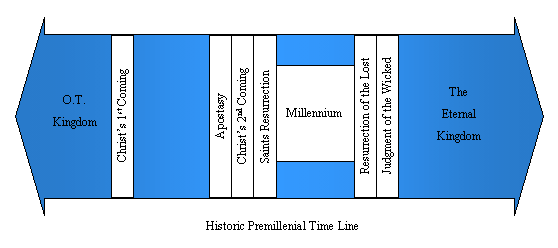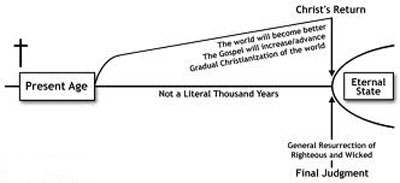continued from Why Eschatology Matters Part IV
I. Pre-millennial View: This is the view that the parousia (second coming) occurs at the conclusion of the Church age and Christ rules from Jerusalem for a literal millennium.[1] Adherents, myself included, argue that a consistent literal interpretation of the Abrahamic and Davidic covenants, predictions by the prophets and the announcement of the kingdom of heaven by John the Baptist and Jesus unavoidably lead to premillennialism.[2] It was the accepted view of the early church fathers up to early Augustine, who later erroneously discarded the view due to a personal prejudice against a particular belief (cited under amillennial).[3] Later post reformation teachers of the Lutheran, Reformed, and Puritan traditions like Jonathan Edwards, John Gill and Charles Spurgeon rediscovered premillennialism.[4] Today it is widely held by protestant evangelicals.
A. Basic Premises:
i. Millennium: A straight forward one thousand years as the text in Revelation chapter 20:1-6 says. The idea of a thousand year reign may also be supported by passages such as Acts 3:19–21 and 1 Corinthians 15:23–26, which speak of a future restoration and reign of Christ.[5]
ii. Resurrection: There are two resurrections the first are believers at the beginning of the millennium and the second at its conclusion for the great white throne judgment.[6]
iii. The Binding of Satan: Jesus Christ binds Satan upon his return. Dr. John Walvoord comments, “The passage makes clear that Satan is not simply restricted, as some would teach, but he is totally inactive in the Millennium.”[7] This point is simply not explained by any other view.
iv. The reign of Christ: While Christ is spiritually active in the lives of believers today his literally earthly reign will commence upon his arrival. He will rule from Jerusalem on the throne of David as promised in the New (Lk. 1:32) and Old Testaments (Zech. 14:9).
v. The Kingdom of God: The kingdom is here and also not yet. In Matthew 13:11, Jesus instituted a spiritual kingdom until His second coming, when He will initiate the anticipated messianic kingdom.[8]
vi. Israel: God will restore national Israel and fulfill all of His unconditional promises. At the end of the Tribulation, before the beginning of the Millennium, when Jesus is finally accepted by Israel, “all Israel will be saved” (Rom. 11:26).[9]
vii. Hermeneutic: A ‘literal’ interpretation means the understanding which any normal person would conclude. Premillennialism is rooted in a historical-grammatical interpretation of prophecy. The historical-grammatical method involves giving each word the same meaning it would have in normal usage.[10] (i.e. Israel means national Israel and thousand means 1,000).
B. Points of Strength:
i. The early church was indisputably premillennial, including: Clement of Rome, Ignatius of Antioch, Lactantius and Irenaeus. Irenaeus was a disciple of Polycarp who had direct contact with John, the author of the Apocalypse.[11] Their familiarity with the Apostle makes it hard to imagine why anyone would diverge from their understanding. Irenaeus wrote extensively on the literal future Messianic kingdom, a brief excerpt being, “The predicted blessing, therefore, belongs unquestionably to the times of the kingdom, when the righteous shall bear rule upon their rising from the dead.”[12]
ii. Stated as a weakness in the opposing views, the fact that the New Testament explicitly teaches that Satan is alive and well on planet earth (1 Jn. 5:19, 2 Cor. 4:4, 2 Cor.4:3-4, Eph. 2:2, 2 Cor. 11:14, 1 Pet. 5:8). The argument seems overwhelming that Satan’s current imprisonment is absurd. Anyone who tries to advance the Gospel knows that Satanic opposition is very real.
iii. In the New Testament, the Angel Gabriel promised Mary that Jesus would sit upon the throne of David (Lk. 1:32-33). At that time there was no Israelite throne to sit on, even Herod was a vassal and this promised event has not yet occurred. Because God always keeps his promises it follows that this will be actualized.
iv. In Romans 9, 10, and 11 Paul’s purpose was to explain Israel’s future. If you simply read that sequence of chapters, replacement theology is absurd. The gentile church is clearly described as “grafted into” not replacing Israel. Paul makes it abundantly clear in Rom. 11:29 that their election is irrevocable.
C. Points of Weakness:
i. The final releasing of Satan at the end of the millennium and subsequent apostasy after the millennium kingdom is difficult to explain. Yet Revelation 20 clearly predicts it.
ii. The millennium population of humans in a non-translated state must be rationalized by believers that come to faith during the tribulation.
iii. Satan was defeated at the cross. Why does he still have dominion on earth?
iv. The ambiguity about the timing of the rapture is problematic.
Conclusions
Premillennial eschatology not only offers a real hope for the world’s future through its anticipation of the personal earthly reign of Jesus Christ for one thousand years, it also provides for the literal fulfillment of God’s covenant promises to Israel and Mary in the New Testament. Concerning the kingdom Missler argues,
There are at least 318 references in 216 chapters of the New Testament. And 23 of its 27 books give prominence to the event. The early church looked longingly for His promised return as their “Blessed Hope” to rid a desperate world of its evil rulers.[13]
In contrast, those promises are given only a vague fulfillment in amillennial and postmillennial eschatology, a psuedo-fulfillment that only weakens our faith in the promises of the Bible. God promised a real space time kingdom headquartered in Jerusalem. God does not lie. It is dangerous when one’s theological constructs impute the character of God. It’s fascinating how contrary supersessionism is to God’s sovereign election. If it is true, it means that God’s elect nation lost their election. That sounds suspiciously like Arminiainism. Isn’t it ironic that most reformed denominations embrace it? They need not. Jesus in Luke 19:42 and Paul in Romans 11:25 explain that Israel is blinded nationally for the church age. Temporarily blinded not replaced. We are grafted in. National Israel has a future as the spiritual leadership of the world (Zech 8:23).
I find the amillennial and postmillennial views both to be incoherent. They are inconsistent with reality and the biblical text. I can evidence both points in that Satan’s deceptions have not been restrained. The numerous biblical proof texts have been cited throughout this series and the nations are demonstrably being deceived. The U.S. Center for World Missions estimates that Christianity’s is growing at about 2.3% annually, approximately equal to the growth rate of the world’s population. Islam is growing faster: about 2.9% and is thus Islam will surpass Christianity as the world’s main religion by 2023.[14] Whether this is completely accurate is immaterial to the point that the world is full of false religion and unbelief. Jesus warned of widespread deception and we certainly do see it today.
I sincerely cannot believe a person can read the bible without outside influence and come to a conclusion other than premillennialism. Just read Revelation 20, that is clear and literal 1000 year kingdom. The alternate views are imposed on the text for external reasons. Of course sincere Christians maintain these views but I just do not find their rationale compelling. To embrace allegory over literal meaning requires a more persuasive theological and exegetical basis than the arguments offered. I have demonstrated that Augustine’s basis was quite shallow and had nothing to do with exegesis. I think those views stand on mere stubborn tradition. While the reformers did a great service in the areas of soteriology and ecclesiology they were duly occupied and failed to correct eschatology back to the apostolic intention. The early church, which had intimate contact with John the author of the Apocalypse were verifiably premillennial. I find that decisive. Finally, no matter what one’s millennial position, true Christians all look forward to the soon return of our Lord Jesus Christ.
θά, μαράνα θά
[1] Ed Hindson, Revelation, 89.
[2]Norman L. Geisler, Systematic Theology, Volume Four: Church, Last Things (Minneapolis, MN: Bethany House Publishers, 2005), 553.
[3] Geisler, Systematic Theology, 567.
[4]Geisler, Systematic Theology, 572.
[5]Elwell and Comfort, 896.
[6] Edward Hindson. Revelation: Unlocking the Future, (Chattanooga, TN: AMG Publishers, 2002), 203.
[7] John F. Walvoord, The Prophecy Knowledge Handbook, Includes Indexes. (Wheaton, Ill.: Victor Books, 1990), 625.
[8] Geisler, Systematic Theology, 556.
[9] Geisler, Systematic Theology, 556.
[10] Geisler, Systematic Theology, 416.
[11] David Noel Freedman, The Anchor Bible Dictionary (New York: Doubleday, 1996, c1992), 3:457.
[12] Quoted in Geisler, Systematic Theology, 569.
[13] Chuck and Nancy Missler. The Kingdom, Power and Glory: The Overcomer’s Handbook. Coeur d’Alene, ID: The King’s Highway Ministries. 2009. 100.
[14] Unattributed. “Growth Rate of Christianity & Islam” Religious Tolerance ORG, http://www.religioustolerance.org/growth_isl_chr.htm (accessed 06/10/2010).





